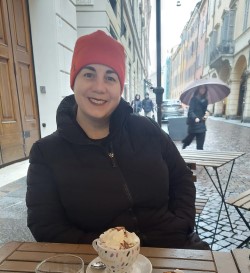
Celeste M. Newby, MD, PhD, FACP
Clinical Assistant Professor, Academic Hospitalist
1. What is your current professional position?
Clinical Assistant Professor, Academic Hospitalist
2. Why did you choose internal medicine?
I like solving puzzles and connecting with people. My primary patient population includes unhoused individuals, patients living with substance use disorder, patients who are incarcerated, and patients who are underinsured. Outside my clinical work, my interests lie in health policy, health advocacy, and health equity. Internal medicine is a field in which you see the stark inequities of our health care system on a daily basis. Getting involved with health policy helps me combat the injustices I witness in the health care system. I really started getting involved with ACP after I attended an ACP Leadership Day in Washington, DC. Leadership Day is a wonderful experience, and I would encourage all ACP members to participate if they can. Providing lawmakers with real-world examples of how laws and policies affect patients' lives is so important. The conversations from Leadership Day help congressional leaders and their staff understand the downstream effects of legislation on patients, physicians, and health care systems.
3. What trends are you seeing in your day-to-day practice (with patients, the health care system, or otherwise)?
Post-COVID pandemic, our health care system is at a tipping point. Primary care in this country is in crisis. There is much work to be done at the federal level around the physician workforce, Medicare payment reform, and physician burnout. With the polarization of our government and political parties, I worry that these critical issues will not receive the attention they need in a timely and thoughtful manner.
4. What do you want to accomplish professionally within the next five years?
I am interested in continuing my work in health policy, advocacy, and equity at the state and national levels. The encroachment of laws on the patient–physician relationship is very concerning to me, and I fear this will lead to poorer health outcomes for vulnerable populations. I am excited to work with state and national ACP health policy leaders to improve the lives of our patients through policy change.
5. Can you share a brief (and anonymous) patient encounter or professional situation that made you proud to be an Internal Medicine physician?
Recently, a patient was complaining about the slow and frustrating prior authorization process for a certain medication. I was proud to tell them that I had recently fought for legislation to improve the prior authorization process in our state. I like my patients to know I am fighting for them not only in the clinic but also in the halls of the State House and in Washington, DC.

